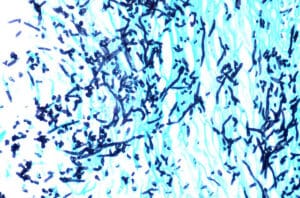
Who would want to believe that any aspect of her or his life could be controlled by a gang of itty-bitty tyrants working in unison? Who wants to think that we noble Homo sapiens are gigantic puppets whose strings are pulled by trillions of very determined squatters and hitch-hikers? But as Dr. Pretlow says:
From an evolutionary biology standpoint, it makes sense that gut bacteria would develop biochemical effects on the host organism in order to enhance symbiotic survival.
That is unsettling enough, but then these other critters sneak in and give our native bacteria something new to wrangle and negotiate with. They are not even decent bacteria, but fungal microorganisms. Yesterday, Childhood Obesity News looked at Candida, which at times literally refuses to respect our boundaries, and penetrates our intestinal walls.
Undesirable substances get into the bloodstream that don’t belong there, and the body sets up an immune response, leading to low-grade but constant inflammation, which leads to metabolic syndrome. Or maybe the metabolic syndrome causes the inflammation—some issues are not quite clear yet.
In all fairness, it should be mentioned that Candida is not the only substance accused of this piercing behavior. When writing “Some of My Best Friends Are Germs,” Michael Pollan learned about emulsifiers (like lecithin) that are put into many processed foods and then, of course, left behind inside us. They are not organisms—Pollan describes them as “detergentlike”—but it appears that their molecules can also scrape away at the intestine’s protective lining and promote Leaky Gut Syndrome. When debris leaks through into the bloodstream, it can lead to general inflammation and the development of at least 90 auto-immune conditions.
The thing about Candida is that it not only pokes holes through the intestinal wall, but also has the nerve to set up a distillery right inside of us and make moonshine, which enters the bloodstream through those holes that it made. Alcohol is one of the most pervasive addictors, the one that inspired the archetypal 12-step program upon which all others are based. An article on “Candida and Gut Dysbiosis” says:
As Candida is a yeast, it produces alcohol (ethanol) and acetaldehyde (this is the chemical responsible for the main symptoms of a hangover) as the major products of its metabolism. In healthy individuals alcohol can be detected in the blood from exactly this source but it is at a level that doesn’t cause any problems as the body’s detoxification systems can cope with it. If however you have an overgrowth of intestinal Candida, the levels of alcohol entering the bloodstream are going to be greatly increased.
So this organism can both poke holes in the intestine, making it permeable or “leaky,” and also manufacture two very toxic chemicals to inject into those holes. Could this have anything to do with why so many people fall off the wagon?
Apparently, a relapse can be triggered by eating foods cooked with wine. Even using mouthwash can cause a recovering alcoholic to lose his or her sobriety. And yet, because of Candida, the microbiome of an alcoholic could be overrun by tiny creatures intent on sabotage, working tirelessly to flood the system with alcohol. Sobriety might be a hopeless goal. No wonder so many programs have such high recidivism rates.
Your responses and feedback are welcome!
Source: “Some of My Best Friends Are Germs,” MichaelPollan.com, 05/15/13
Source: “Candida and Gut Dysbiosis,” Ei-resource.org, 01/27/15
Image by Yale Rosen

 FAQs and Media Requests:
FAQs and Media Requests: 











